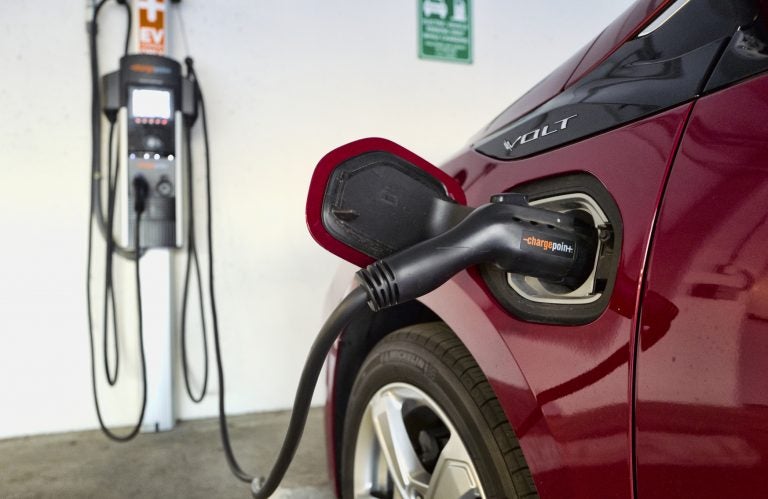N.J. drivers can’t claim $5,000 electric vehicle rebate yet. Here’s why.
N.J. Gov. Phil Murphy trumpeted the rebate program before state regulators set up how it would work.

(Richard Vogel/AP Photo, file)
Eric Fierro had been itching to buy an electric vehicle for years. So when New Jersey launched a generous $5,000 rebate program on the cars this month, the teacher and coach at Southern Regional High School was fired up.
“Boom! It’s like, this is what you’ve been waiting for, coach. Let’s go!” he said.
When he went to a local dealership, though, the employees there were confused. First, they told him the program wasn’t up and running yet. Then, they said it was, but he’d have to figure out how to get the money himself.
Originally looking to buy, Fierro settled on leasing a 2019 Chevy Bolt to limit his financial exposure should the rebate fall through.
“I’m anticipating there being a chance that this doesn’t happen,” he said. “I’m hoping that it does. I’m about 50-50 right now, I’d say, that I get the $5,000.”
The problem is that New Jersey Gov. Phil Murphy trumpeted the rebate program before the state Board of Public Utilities had time to set up how it would work.
Asked to clarify the situation on his monthly call-in radio show, Murphy vouched that the rebate would apply to all electric-vehicle purchases or leases dating back to Jan. 17, the day he signed the program into law.
“The rebates will become available in spring, but they’ll be retroactive to any purchases since I signed the bill,” Murphy said. “That will be a mail-in process, so you’ll get the check by mail. Beginning in the summer — I don’t have a specific date — it will be what they call cash on the hood, meaning it’ll be a rebate literally at the point of sale.”
For now, those interested in driving a new electric vehicle will have to take the governor at his word. Asked to confirm the details, a spokesperson for the Board of Public Utilities said they are still in the works.
“Board staff is in the process of developing the program along with the program manager, Center for Sustainable Energy,” said spokesperson Peter Peretzman. “It will then be presented to the Board for consideration and potential approval.”
According to the new law, the rebate will apply to vehicles with a retail price below $55,000 that are registered in New Jersey. How big a credit drivers get depends on how far their vehicle can travel on a single charge. The state will offer $25 for each mile the car runs on electric power instead of gas, up to a $5,000 cap.
That means cars with 200 miles of electric range or more — such as those offered by Tesla, Chevrolet, Nissan and several other carmakers — would qualify for the maximum amount.
Plug-in hybrid cars are also eligible for the rebate through 2022, although with a median electric-only range of 21 miles, buyers would get only about $525 back.
Separately, the state may soon offer up to $500 back to people who install charging equipment in their home, although the Board of Public Utilities has not set up that program either.
Jim Appleton, president of the New Jersey Coalition of Automotive Retailers, said in an interview that consumers can be confident the state will follow through on its promise.
“I think consumers can trust in the fact that the legislation, which was signed Jan. 17, became effective immediately, which means any vehicle with a purchase price of $55,000 or less, which is titled or registered in the state of New Jersey by a New Jersey resident, will qualify for the rebate,” he said.
Fierro said the first few days zipping around in his new Bolt have been a pleasure. Electric cars are fast, he said, and make sense for his life. He has a relatively short commute to work. He can use the public charging stations at Stockton University, where he also helps coach basketball. And he has solar panels on his roof at home, lowering the cost of charging his car even further.
Getting $5,000 from the state would make the experience even sweeter.
“You never know,” he said. “Things could change.”
WHYY is your source for fact-based, in-depth journalism and information. As a nonprofit organization, we rely on financial support from readers like you. Please give today.





